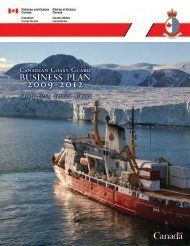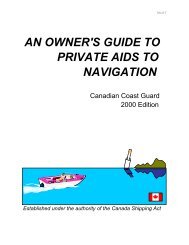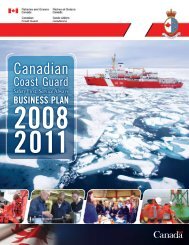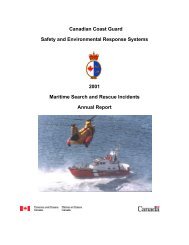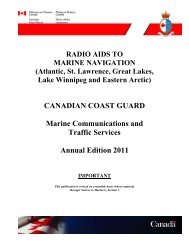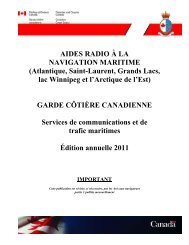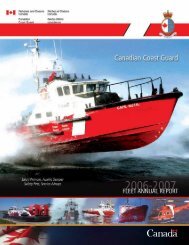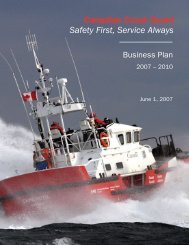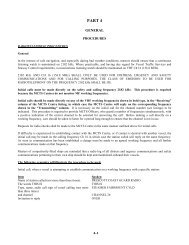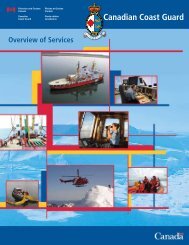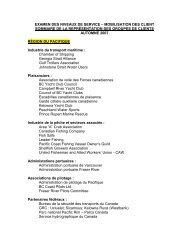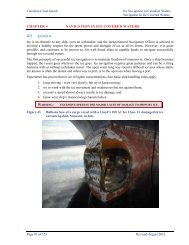RADIO AIDS TO MARINE NAVIGATION - Canadian Coast Guard
RADIO AIDS TO MARINE NAVIGATION - Canadian Coast Guard
RADIO AIDS TO MARINE NAVIGATION - Canadian Coast Guard
Create successful ePaper yourself
Turn your PDF publications into a flip-book with our unique Google optimized e-Paper software.
c. Marine and Environmental Advisories, Watches and Warnings are distributed through various mechanisms<br />
including partnerships with national and regional media distributors and local emergency measures organizations.<br />
The Voluntary Observing Ship (VOS) Program<br />
The VOS program is organized for the purpose of obtaining weather and ice, and oceanographic observations from<br />
moving ships. An international program under the auspices of the WMO, the VOS has nearly 8,000 vessels participating<br />
from 60 nations. It is part of the WMO Global Observing System of the World Weather Watch. Canada has near 235<br />
vessels participating. It closely follows WMO guidelines for VOS programs.<br />
The <strong>Canadian</strong> program is supported by full-time Port Meteorological Officers (PMO). The national program office in<br />
Toronto manages the program and oversees PMO activities. The office also maintains a VOS Program Computerized Data<br />
Management System to record PMO ship visits, vessel mailing addresses, vessel equipment inventories and other<br />
information about vessel reports. Any vessel willing to take and transmit observations in marine areas where Environment<br />
Canada prepares weather forecasts (see the regional annexes) can join the program. The importance of ship reports cannot<br />
be overstated. Without your participation in VOS, there would be vast marine areas without data, making marine<br />
forecasting nearly impossible for these areas. We thank ships’ officers and crew for their fine work, dedication, and<br />
commitment.<br />
Mariners are also encouraged to inquire about the SEAS (Shipboard Environmental data Acquisition System) program<br />
with their regional PMO. Under the SEAS program, observations are sent via INMARSAT C and the cost of transmission<br />
is absorbed by a consortium of countries interested in timely marine observations on a global scale.<br />
The WMO establishes the ships synoptic code, and procedures and standards for the collection and dissemination of<br />
information worldwide. The WMO also maintains information about countries and vessels participating in the program.<br />
Buoys program<br />
In order to complement the observational network, Environment Canada operates a network of buoys across the country.<br />
This data becomes part of the collection of weather reports sent to the distribution network and is used to improve marine<br />
forecasting. The location, WMO identifiers and names of the Environment Canada buoys are given in the regional annexes.<br />
Mariners are requested to use caution when approaching buoys as mooring chains are normally not detectable from a ship<br />
and can be damaged or even severed if there is contact. Such a mishap could possibly result in the buoy becoming adrift<br />
thus requiring a costly effort to recover the platform. Please keep the Regional PMO's informed of any incidents involving<br />
buoys.<br />
Buoy Locations: buoy positions are described in each specific regional annex.<br />
Port Meteorological Officers (PMOs)<br />
PMOs spend most of their time visiting ships in support of the VOS program. This is to encourage vessels to report<br />
weather and ice conditions, to instruct observers about procedures and the use of code; to supply observing forms,<br />
handbooks (free of charge!); to calibrate equipment; and, in some cases, to install, on loan, meteorological or<br />
oceanographic instrumentation. The PMO is also responsible for recruiting new vessels wishing to participate in the VOS<br />
program.<br />
If a PMO visits your ship, feel free to ask questions about observing and coding, and reporting weather and ice<br />
conditions. Inform the PMO of any concerns you may have with forecasts, warnings, or facsimile products, especially if<br />
you have specific problems. The PMO will contact the appropriate party for investigation. Keep the PMO informed of your<br />
contact information.<br />
5 - 4



